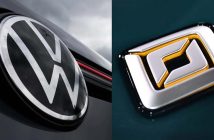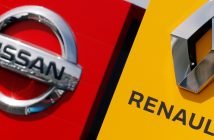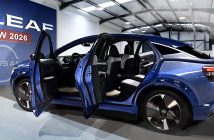+++ AUDI has launched a new car-sharing pilot program, exploring how the service can be utilized for corporate fleets. Known as “Audi shared fleet,” the program will initially be limited to a set of three red 2017 A4 sedans. The fleet will be based at American Underground’s 115,000-square-foot technology incubation ‘startup space’ in Durham, North Carolina. Mimicking a typical car-sharing service, the A4 sedans can be reserved and unlocked via a dedicated mobile app. “In our urban ecosystem, this program will alleviate 2 major pain points for our entrepreneurs: a need for easy, face-to-face collaboration across all points of the Research Triangle and a desire to utilize public transportation in their commute to avoid parking restraints”, said American Underground chief strategist Adam Klein. “The fact that our entrepreneurs can now accomplish these needs in the style and performance of an Audi is a very pleasant bonus”. Audi has already committed to a wider rollout, with plans to offer similar services across the country next year. In the meantime, the company is still running a separate car-sharing pilot, ‘Audi at home,’ that provides a private fleet of vehicles for residents in certain exclusive apartment developments. The program has been running for nearly a year, still apparently focused on the San Francisco market. +++
+++ FORD said on Thursday it will idle the Wayne, Michigan factory an extra 2 weeks by the end of the year, adjusting to light demand for the Focus and C-Max Plug-in Hybrid made there. This is in addition to the normal holiday shutdown for all Ford North American plants in the last week of the year, a Ford spokeswoman said. Ford, when it issued its third quarter earnings earlier on Thursday, said it was cutting inventories because it expects a slight downturn in the U.S. new vehicle market in 2017. Ford Chief Financial Officer Bob Shanks said one of the three shifts at the F-150 pickup truck plant in Kansas City, Missouri will be out next week to manage inventory. This is in addition to this week’s full-plant shutdown for the same reason, which Ford revealed earlier this month. The Michigan Assembly Plant in Wayne is the same factory Republican presidential nominee Donald Trump pointed to when he blasted Ford for moving U.S. jobs to Mexico. Chief Executive Officer Mark Fields has said Ford is maintaining American jobs by keeping the company strong enough to compete in a tough market where profit margins for small cars are slight. During contract talks in 2015, Ford confirmed that it would move Focus and C-Max production out of its Wayne, Michigan, plant in 2018. The United Auto Workers union said at the time that Ford planned to build the next Focus in Mexico. A source briefed on the matter said the shift of production to Mexico was expected to take place next year before the start of the 2018 model year. In April, Ford reiterated that it was planning to build 2 new vehicles at the Wayne plant beginning in 2018. UAW officials have and analysts have said they expect Ford to build a new Bronco SUV and Ranger midsize pickup there. Earlier this month, Ford also announced temporary plant shutdowns in Kentucky and in Mexico to manage inventory of its Kuga/Escape, 3 Lincoln models and the Fiesta. +++
+++ Prime Minister Theresa May’s deal to keep NISSAN investing in Britain opened the floodgates to demands from rival car companies chasing their own assurances from the government that they won’t be hurt by Brexit. Britain’s biggest car maker Jaguar Land Rover and its biggest engine maker Ford welcomed the news that the Japanese group would build 2 new models in the northeastern English city of Sunderland. Both said they too needed to avoid the risk of being hit with tariffs on trade with the European Union. While the exact nature of the deal remains unknown, its announcement raised the prospect that Britain might be adopting an interventionist approach to placate exporters as it prepares to leave the world’s biggest trading bloc – a stark change for a country known for its hands-off approach to business. “In isolation this wouldn’t be a big issue, but this could be the start of a slippery slope where the government gets much more drawn into individual deals and negotiations than historically they have”, Andrew Sentance, a former Bank of England policymaker and adviser to PwC, said. Dismissive of the more interventionist approaches of countries such as France and Germany, Britain became a leading destination for foreign investment by coupling a flexible labor market and low taxes with little state involvement in business. But the shock vote in June to leave the EU has heralded the biggest change in the way corporate Britain is run for at least a generation. A source told Reuters on Thursday the British government promised extra support to Nissan in a written assurance that Brexit would not hit the competitiveness of the Sunderland plant, which exports 55 percent of its cars to Europe. The government refused to go into details but said there had been no “sweetheart deal”. Last month Nissan’s CEO Carlos Ghosn warned that he would need a guarantee of compensation to offset any tariffs. Following a meeting with May earlier this month, Ghosn expressed confidence that her government would ensure Britain remained a competitive place to do business. News of the deal prompted an immediate reaction from rivals, who also raised the question of recruiting foreign staff if the government curbs immigration, as it has promised. “We are talking to government at every level and asking for a tariff-free trading environment, access to talent and the same legislative framework we have now”, Jaguar Land Rover said. “We want a level playing field”. While Nissan’s Sunderland factory made nearly one in three of Britain’s 1.6 million cars last year, Indian-owned Jaguar Land Rover produces more vehicles overall at several sites. Other exporters were keeping a close eye on the Nissan developments, with the boss of Airbus UK saying the agreement showed the aerospace and defense sectors needed to work together. One leading London banker, who declined to be named, said May appeared to be “playing to the home crowd” by prioritizing the auto industry over financial services. Ford said it needed to sell its British-made engines into Europe without tariffs and that it was looking for similar reassurances from the government. “I don’t think the government will be picking winners and losers in our industry”, Jim Farley, vice president for Europe, Middle East & Africa, told Reuters. “I would be very surprised if the UK government treats different companies differently”. Britain’s big carmakers are nearly all foreign-owned and ship more than half of their exports to the other 27 countries of the EU, making the industry’s future one of the big question marks hanging over Britain’s plan to quit the bloc. Late Prime Minister Margaret Thatcher lured Nissan to open the Sunderland plant in 1986, beginning a recovery in British car-making that had nearly collapsed in the 1970s. Colin Lawther, a senior vice president at Nissan, said Brexit had posed a “big hurdle” for the car industry. “The UK government has been very good at working with us over the last few months to remove the uncertainty as much as they possibly can”, he told reporters. Like most parts of England’s industrial north, Sunderland voted strongly in favor of Brexit on June 23. The deal led to speculation as to what the government had offered Nissan to persuade it to make the next generation of its Qashqai and X-Trail at Britain’s largest car plant. Vince Cable, a former business minister who helped persuade General Motors to keep its north of England plant open in 2012, said he believed the Nissan announcement was a sign that the government would push for a “soft Brexit” deal with the EU that avoided the imposition of tariffs altogether. “One of the key factors in keeping General Motors here was the confidence they had that we would stay within the European single market and the customs union”, he told Reuters. Countries such as Turkey are part of the EU customs union without being member states, enabling them to trade freely with the bloc. “I think the government almost certainly made it clear that British negotiating objectives will be to remain within the customs union”, Cable said. “I can’t see how anything other than a customs union arrangement would satisfy the car industry”. +++
+++ Ratan TATA may have dumped Cyrus Mistry as chairman of his 148-year-old family empire, but will find it harder to expunge the ex-manager’s accusations that his acquisitive habits and lack of focus on returns have destroyed billions of dollars in shareholder value. Tata Sons has rejected as baseless and malicious the allegations that Mistry, 48, laid out in a 5-page letter to the board accusing Ratan Tata of backseat driving while in retirement and of thwarting his drive to restructure and refocus the $104 billion Indian conglomerate. Tata has launched a four-month search for a new chairman, and whoever lands the job will inevitably face the same challenges that Mistry felt he was unable to tackle because, he alleged, he lacked the backing of a board that he said answered only to Ratan Tata. “What was 10-15 years ago – a Tata group that was a paternalistic conglomerate with more than 100 companies just ambling along – no longer works”, said Shriram Subramanian of InGovern, a shareholder advocacy group. “Shareholders need reassurance that the Tata operating companies are really working to enhance shareholder value rather than acting on the whim of one individual”. The incoming chair also faces possible regulatory probes after Mistry alleged a total breakdown in corporate governance, and said a “realistic assessment” of the group’s portfolio would require $18 billion in writedowns. Mistry, fired as Tata Sons chairman, remains a director as well as chairing listed subsidiaries Tata Motors, Tata Steel and Tata Consultancy Services. Should he refuse to go quietly, any attempt to oust him after his acrimonious split with the 78-year-old patriarch risks becoming messy. Further, Mistry’s Pallonji family owns nearly a fifth of Tata Sons, while Tata family trusts control a two-thirds stake. “This saga has not gone well and isn’t good news in relation to the long-term strategic direction of the group”, said a manager at a large Mumbai-based institutional investor that owns shares in some Tata group companies. “It doesn’t affect the near-term operations of the companies, but strategically, in the long run, companies get impacted”. A person close to the Tatas warned that “the fight has just started”, while recognizing that Mistry had inherited all of the group’s legacy issues, from steel to telecoms, and could have done little to rectify them. Outside investors can only own shares in Tata’s listed units. Lacking influence over strategy at group level, they have reacted to the bust-up by voting with their feet, erasing an estimated $4 billion from their combined market value this week. While the battle between Mistry and Tata plays out in public, and perhaps even the courts, the company is launching a search for a worthy successor. On Tuesday, Tata named N. Chandrashekharan, CEO of TCS, and Ralf Speth, CEO of Tata Motors’ luxury car arm, Jaguar Land Rover, as directors to the Tata Sons board, fuelling speculation that one or both are frontrunners. Whoever takes the top job must work with a board that has both a duty to protect not just the interests of its shareholders, but is also committed to other stakeholders in a group that employs 660,000 people and has accounted for 8 percent of the Bombay Stock Exchange’s market capitalization. The crux of the Tata world view, said Morgen Witzel, a UK-based business historian and author of a book on the Tata company, is that shareholder value should not be an end in itself. “Companies are not machines for making money. They exist to provide value and service to their communities; profit is a by-product of that process”, he said. To his credit, Mistry had made headway in his bid to change Tata’s slow and bureaucratic way of working, and turn it into a younger, more agile and inclusive organization by tearing down the barriers of hierarchy. “Ratan was about growth and turnaround, Cyrus believed you could only do that to a certain level but then you have a responsibility to grow returns for your shareholders for which you have to cut debt and be nimble”, said another person close to the company, adding that this jarred with the Tata ethos. Suresh Raina, managing partner at executive search firm Hunt Partners, noted the Tata Sons board focuses on strategy and not operations, and worries little about quarterly profits. “That’s where the values become central to how the board operates”, Raina said. “How the candidate aligns with these tenets and criteria will be more important than the business imperatives”. +++
+++ TESLA’s shares rose more than 5 percent in early trading on Thursday as investors welcomed the electric car maker’s first quarterly profit in more than 3 years and its reassurance that the Model 3 sedan would not need new capital. Tesla boss Elon Musk said on Wednesday the company’s current plan didn’t require new funding, after going back and forth this month about needing to raise money to fund the launch. Tesla, whose shares have fallen nearly 16 percent this year, said its profits were helped by nearly $139 million in sales of clean car credits. Tesla’s shares rose to $213.40 in morning trade on Thursday. Wall Street analysts, however, remained skeptical and said they expected the company to hit the market for money sooner than Musk had suggested. “Management asserted that it would not need to raise cash, but our model forecasts Tesla ending 2018 with $575 mln, which we think is too close for comfort”, Cowen and Co analyst Jeffrey Osborne said in a note. He rates the stock “underperform”. Tesla said it planned capital spending of $1.8 billion for the year – about a fifth lower than the automaker’s previous forecast – with just over $1 billion of the outlay coming in the fourth quarter. Tesla said it had $3.08 billion in cash and cash-equivalents as of Sept. 30, compared with $3.25 billion at the end of the second quarter. “The bulk of 2016’s capital spending will occur in the fourth quarter, which likely leaves 2016 cash flow negative and Tesla needing capital market infusion in 2017”, CFRA Research analyst Efraim Levy told Reuters. “It was a kitchen sink effort to get the third quarter to look good ahead of the deal vote”, he said. Tesla ended the third quarter with positive free cash flow (FCF) of $176 million, but is FCF negative for the nine months ended Sept. 30. Analysts, however, said the third-quarter profit – the company’s second ever – and a forecast that it could turn a profit again in the current quarter would improve the odds of investors approving Tesla’s deal to buy debt-laden solar panel maker SolarCity Corp. “The positive optics in this print … and likely lower-than-expected SCTY cash drain on Tesla may help improve investor sentiment, and therefore improve the chances of SCTY merger approval”, Barclays analyst Brian Johnson said. Tesla and SolarCity’s shareholders are expected to make a final vote on the SolarCity deal on Nov. 17. Of the 20 brokerages covering the stock, 4 rate the stock “buy” or its equivalent, 9 a “hold” and 7 a “sell”. The stock has a median price target of $205. +++
+++ Ford and General Motors have worked all year to convince investors that they are no longer prisoners of the UNITED STATES auto market cycle and have solid plans to fend off challenges from Silicon Valley interlopers. This week, Wall Street looked at the Detroit companies’ stronger-than-expected quarterly results and turned thumbs down. General Motors, the largest U.S. automaker, reported record third-quarter net income on Tuesday, but its shares have fallen nearly 5 percent since then. Ford shares sank more than 1 percent on Thursday, bringing their year-to-date decline to about 17 percent, or about $7 billion of the company’s market capitalization. The selloffs put more pressure on General Motors and Ford’s chief executive officers to accelerate cost-cutting and buy back more shares. They must also make tough decisions between slashing production to prop up prices, or gunning for market share at the risk of reducing profit margins, analysts said. Highlighting Detroit’s problems with investors was the market’s response to Tesla’s results. Late on Wednesday, the electric luxury car maker headed by billionaire Elon Musk announced its first profitable quarter in three years, with net income of $22 million. By comparison, General Motors reported net income of about $2.8 billion and Ford, nearly $1 billion. Shares of Tesla were up 4 percent on Thursday, boosting the company’s market value to more than $30 billion. Wall Street has penalized General Motors and Ford shares this year because investors are convinced that a cyclical downturn is nigh for U.S. auto sales, which hit a record of about 17.5 million vehicles last year. Ford said in July that the 6-year auto boom since the economic crisis was over and that sales would erode from their 2015 peak while still plateauing at historically lofty levels. Investors will watch as Ford and General Motors pursue contrary strategies for the fourth quarter in North America, where they generate nearly all of their profits. General Motors said on Tuesday that it bulked up inventories at U.S. dealers by more than 110,000 vehicles during the third quarter, and executives said they anticipated strong demand to continue. Ford, however, plans to cut fourth-quarter production in North America by 12.5 percent from a year earlier to keep dealers’ lots from overflowing and avoid profit-sapping discounts. The company is idling one shift next week at a Kansas City, Missouri, plant that makes the F-150 pickup, its best-selling vehicle and one of its most profitable models. The company disclosed on Thursday that it was also closing a plant in Wayne, Michigan, for an extra 2 weeks before the end of the year to adjust production to demand. Ford’s results reflect Detroit’s challenges. Third-quarter net income fell by more than 50 percent because of declining sales in North America, higher recall costs and a costly and complicated introduction of a new pickup. Still, the company backed its full-year earnings outlook and said it expected to generate cash this quarter after burning through $2 billion in the third quarter. CEO Mark Fields urged investors on Thursday to value Ford based on its efforts to break into new markets such as ride sharing and autonomous vehicles that promise higher profit margins. However, General Motors’ $1.2 billion and Ford’s $500 million of publicly disclosed investments in these businesses are dwarfed by the $16 billion ride services leader Uber Technologies has raised in debt and equity, according to a Reuters analysis. For now, said Ford Chief Financial Officer Bob Shanks, “what’s happening to the company is what’s happening in North America”. Ford’s North American revenue fell 8 per cent in the third quarter. At General Motors, CEO Mary Barra has matched or beaten financial targets for profit, share repurchases and return on invested capital agreed upon with activist investors last year. Still, General Motors shares are down nearly 8 percent this year. “There are just a lot of headwinds due to the idea of peak auto”, Morningstar analyst David Whiston said. ” General Motors’ just going to have to keep beating numbers and keep buying back their shares when it’s cheap like it is now”. +++
+++ The European Commission fears steps taken by VOLKSWAGEN to refit polluting diesel cars may damage the vehicles’ engines, the Spiegel magazine reported, citing unidentified staff at the European Union’s executive branch. Software updates carried out by Volkswagen could inflict greater stress on engine components, Spiegel cited a member of staff at the Brussels-based Commission as saying. Commission officials are basing their concerns on feedback from experts at the “Vela” emissions laboratory in northern Italy, the weekly magazine said, without providing more detail. The Commission was not immediately available to comment. Germany-based Volkswagen denied its technical modifications would cause damage to the cars. “The software update will have no adverse influences on fuel consumption or the durability of the engine and its components”, a company spokesman said. EU consumer affairs commissioner Vera Jourova has sought to ramp up pressure on Volkswagen to compensate European owners of rigged diesel vehicles and has asked the carmaker for guarantees its technical fixes will work. “We need Volkswagen to guarantee, in a legally binding way and without any time limit, that the repairs will work and do not have any negative impact”, a Commission official told Reuters on Monday. Consumer groups and politicians in Germany have been angered by Volkswagen’s refusal to offer compensation, noting drivers are stymied in many EU nations by their inability to file U.S.-style class action lawsuits. Germany’s VZBV consumer lobby is backing the EU’s call for Volkswagen to guarantee its technical fixes will have no negative effects on vehicles. But it made no progress in a meeting with Volkswagen to secure such a guarantee, a spokeswoman said. “An advanced guarantee declaration is not necessary”, a Volkswagen spokesman said, noting the carmaker’s diesel fixes were subject to comprehensive tests to ensure there will be no negative impact on engine components or emissions clean-up systems. Germany’s KBA motor vehicle authority has so far cleared 5.6 million diesel cars affected by Volkswagen’s emissions-test cheating scandal for repair. Volkswagen said the number of cars refitted had more than doubled to 1.23 million in recent weeks from 500,000 previously. Approval by the KBA is valid for countries throughout Europe where 8.5 million cars of nearly 11 million vehicles worldwide are affected. Volkswagen Group models with 1.2-litre and 2.0-litre engines only require a software update on pollution control systems, whereas about 3 million 1.6-litre engines, besides the software update, also require a mesh to be installed near the air filter. +++



